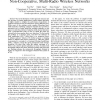Free Online Productivity Tools
i2Speak
i2Symbol
i2OCR
iTex2Img
iWeb2Print
iWeb2Shot
i2Type
iPdf2Split
iPdf2Merge
i2Bopomofo
i2Arabic
i2Style
i2Image
i2PDF
iLatex2Rtf
Sci2ools
INFOCOM
2011
IEEE
2011
IEEE
On adaptive-width channel allocation in non-cooperative, multi-radio wireless networks
—Due to the limitation of radio spectrum resource and fast growing of wireless applications, careful channel allocation is highly needed to mitigate the performance degradation of wireless networks because of interference among different users. While most of the existing works consider allocating fixedwidth channels, combining contiguous channels may provide an alternative way to better utilize the available channels. In this paper, we study the problem of adaptive-width channel allocation from a game-theoretic point of view, in which the nodes are rational and always pursue their own objectives. We first model the problem as a strategic game, and show the existence of Nash equilibrium (NE) , when there is no exogenous factor to influence players’ behavior. We further propose a charging scheme to influence the players’ behavior, by which the system is guaranteed to converge to a Dominant Strategy Equilibrium (DSE), a solution concept that gives participants much stronger ince...
Communications | Dominant Strategy Equilibrium | INFOCOM 2011 | Nash Equilibrium | Performance Degradation |
Related Content
| Added | 30 Aug 2011 |
| Updated | 30 Aug 2011 |
| Type | Journal |
| Year | 2011 |
| Where | INFOCOM |
| Authors | Fan Wu, Nikhil Singh, Nitin H. Vaidya, Guihai Chen |
Comments (0)

